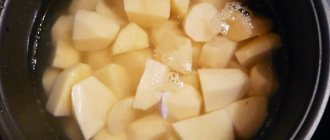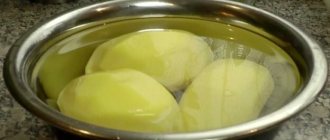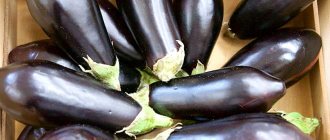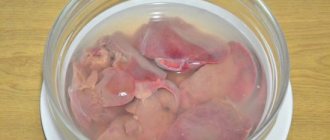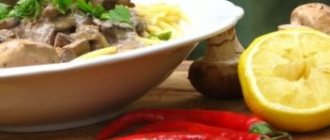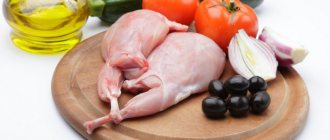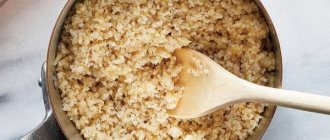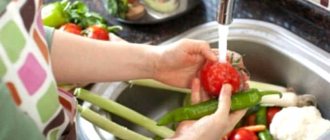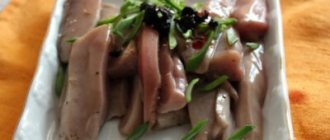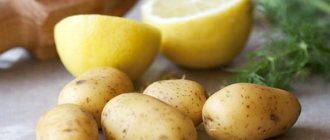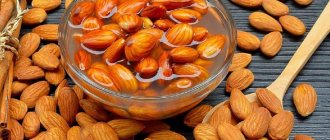Soaking vegetables is a simple and effective way to reduce nitrates. Up to 25 percent of these substances are concentrated on the surface of the peel. Being water soluble, they dissolve into room temperature water within an hour, making the product safer. An even safer option is to cut off the peel to remove up to 80 percent of the hazardous substances if you plan to eat the vegetable fresh. Or subject it to heat treatment: boil, stew, fry. In this case, there are no nitrates left in the vegetables at all.
Potatoes, unlike other vegetables, are not eaten fresh. Therefore, there is no point in soaking it to “remove harmful substances.” When boiling, baking and frying, nitrates are quickly destroyed; from this point of view, the root vegetable is absolutely safe. It is considered dubious for another reason - due to its high starch content.
When potatoes are boiled, nitrates are destroyed (Photo: Footage.framepool.com)
Starch is not as harmful as it seems
Recently, nutritionists have recommended reconsidering our attitude towards starchy foods. Indeed, when they are consumed, blood sugar levels increase. But they satiate well and create a long-lasting feeling of satiety, which is useful for weight control and dieting, as it protects against sudden attacks of hunger.
In addition, the starches in vegetables and grains are different. Simple ones, which are found, for example, in boiled corn and mashed potatoes, are quickly broken down by the body into glucose. But there are complex ones, the so-called resistant ones, they are found in cereal products and whole wheat pasta. With resistant starch, the body has to “tinker” and spend more energy on digestion. Its breakdown takes a long time - over three to four hours, due to which the glucose level rises slowly and decreases just as slowly.
Mashed potatoes contain the most simple starch (Photo: Pixabay.com)
Resistant starch is good for the body. Products containing it do not cause a sharp increase in sugar levels and create a long-lasting feeling of satiety.
Potatoes can be a source of resistant starch even without soaking. To do this, you need to prepare it and put it in the refrigerator for 24 hours. In the cold, the structure of starchy compounds changes; the volume of substances resistant to breakdown increases fourfold.
So the healthiest potatoes are yesterday's potatoes, boiled or baked. When fried, starch is also converted into resistant starch, but the high fat content negates the benefits of the product.
How and how long to soak potatoes?
- Clean the tubers from stains and completely remove problem areas. Greenish potatoes Throw it away immediately, as it contains the toxic substance solanine, which even in small quantities causes inflammation of the gastric mucosa, destroys blood cells and disrupts the functioning of the nervous system.
- Remove the peel, wash, cut the vegetable into cubes, and cover with warm water for at least 2 hours. The liquid should completely cover the contents.
- Then change the water and repeat the process. Fill with water again, adding a little salt and ascorbic acid. If you are using homemade potatoes and you are sure that no nitrates were used when growing them, then you can cook potatoes in their jackets.
- The finer you cut the potatoes (for example, grate them), the faster the starch will release. If you plan to cook the whole tubers, it is better to fill the potatoes with clean water in advance and leave them overnight, since the starch removal time is 12 hours.
What happens if you soak potatoes?
Do not fill with warm or hot water. You need to soak for about one and a half to two hours. During this time, the water will become cloudy and absorb all the starch and harmful substances. After this, the water is drained and the potatoes
washed a couple of times with running water.
Interesting materials:
How to send a link to your desktop? How to evaluate work in Google Classroom? How are test papers assessed in Yaklass? How to rename a shortcut on Android desktop? How to switch to another Windows 10 desktop? How to transfer something from Google to your desktop? How to move a program from the taskbar to the desktop? How to transfer the working environment in Photoshop? How to reboot Android if the button does not work? How to restart your computer via remote desktop?
What are the benefits of potatoes?
Speaking about the benefits of potatoes, people most often can name their not very useful properties, knowing that they consist mainly of water and starch, but few know that potatoes are rich in microelements:
Silicon makes the skin more elastic, blood vessels more elastic, strengthens nails and improves hair condition. Rubidium strengthens the nervous system, increases blood pressure and has antihistamine properties. Vanadium normalizes cholesterol levels in the blood and participates in redox processes in the body. It is necessary for people seeking to lose weight, as well as athletes. Boron improves bone strength, memory, relieves stress and prevents osteoporosis in women during menopause.
In addition to the mentioned beneficial substances, potatoes also contain phosphorus, iron, iodine, magnesium, sodium, calcium, copper, zinc, cobalt, nickel, lithium, manganese, chromium, and Omega-3, vitamins B2, B3, B6, B9 needed by the body , C, PP, K. Potatoes help lower cholesterol levels and remove excess fluid from the body, have a beneficial effect on the gastrointestinal tract and protect the stomach from irritation.
After listing all the “advantages” of potatoes, it becomes clear why in Russia, in addition to price, potatoes have become the “second bread”, that is, one of the main food products.
Calorie content Potatoes without starch for pancakes. Chemical composition and nutritional value.
Nutritional value and chemical composition of “Potatoes without starch for potato pancakes.”
The table shows the nutritional content (calories, proteins, fats, carbohydrates, vitamins and minerals) per 100 grams of edible portion.
| Nutrient | Quantity | Norm** | % of the norm in 100 g | % of the norm in 100 kcal | 100% normal |
| Calorie content | 30 kcal | 1684 kcal | 1.8% | 6% | 5613 g |
| Squirrels | 2 g | 76 g | 2.6% | 8.7% | 3800 g |
| Fats | 0.4 g | 56 g | 0.7% | 2.3% | 14000 g |
| Carbohydrates | 4.3 g | 219 g | 2% | 6.7% | 5093 g |
| Organic acids | 0.2 g | ~ | |||
| Alimentary fiber | 1.4 g | 20 g | 7% | 23.3% | 1429 g |
| Water | 78.6 g | 2273 g | 3.5% | 11.7% | 2892 g |
| Ash | 1.1 g | ~ | |||
| Vitamins | |||||
| Vitamin A, RE | 3 mcg | 900 mcg | 0.3% | 1% | 30000 g |
| beta carotene | 0.02 mg | 5 mg | 0.4% | 1.3% | 25000 g |
| Vitamin B1, thiamine | 0.12 mg | 1.5 mg | 8% | 26.7% | 1250 g |
| Vitamin B2, riboflavin | 0.07 mg | 1.8 mg | 3.9% | 13% | 2571 g |
| Vitamin B4, choline | 11 mg | 500 mg | 2.2% | 7.3% | 4545 g |
| Vitamin B5, pantothenic | 0.3 mg | 5 mg | 6% | 20% | 1667 g |
| Vitamin B6, pyridoxine | 0.3 mg | 2 mg | 15% | 50% | 667 g |
| Vitamin B9, folates | 8 mcg | 400 mcg | 2% | 6.7% | 5000 g |
| Vitamin C, ascorbic acid | 20 mg | 90 mg | 22.2% | 74% | 450 g |
| Vitamin E, alpha tocopherol, TE | 0.1 mg | 15 mg | 0.7% | 2.3% | 15000 g |
| Vitamin H, biotin | 0.1 mcg | 50 mcg | 0.2% | 0.7% | 50000 g |
| Vitamin K, phylloquinone | 1.9 mcg | 120 mcg | 1.6% | 5.3% | 6316 g |
| Vitamin RR, NE | 1.8 mg | 20 mg | 9% | 30% | 1111 g |
| Niacin | 1.3 mg | ~ | |||
| Macronutrients | |||||
| Potassium, K | 568 mg | 2500 mg | 22.7% | 75.7% | 440 g |
| Calcium, Ca | 10 mg | 1000 mg | 1% | 3.3% | 10000 g |
| Silicon, Si | 50 mg | 30 mg | 166.7% | 555.7% | 60 g |
| Magnesium, Mg | 23 mg | 400 mg | 5.8% | 19.3% | 1739 |
| Sodium, Na | 5 mg | 1300 mg | 0.4% | 1.3% | 26000 g |
| Sera, S | 32 mg | 1000 mg | 3.2% | 10.7% | 3125 g |
| Phosphorus, P | 58 mg | 800 mg | 7.3% | 24.3% | 1379 g |
| Chlorine, Cl | 58 mg | 2300 mg | 2.5% | 8.3% | 3966 g |
| Microelements | |||||
| Aluminium, Al | 860 mcg | ~ | |||
| Bor, B | 115 mcg | ~ | |||
| Vanadium, V | 149 mcg | ~ | |||
| Iron, Fe | 0.9 mg | 18 mg | 5% | 16.7% | 2000 g |
| Yod, I | 5 mcg | 150 mcg | 3.3% | 11% | 3000 g |
| Cobalt, Co | 5 mcg | 10 mcg | 50% | 166.7% | 200 g |
| Lithium, Li | 77 mcg | ~ | |||
| Manganese, Mn | 0.17 mg | 2 mg | 8.5% | 28.3% | 1176 g |
| Copper, Cu | 140 mcg | 1000 mcg | 14% | 46.7% | 714 g |
| Molybdenum, Mo | 8 mcg | 70 mcg | 11.4% | 38% | 875 g |
| Nickel, Ni | 5 mcg | ~ | |||
| Rubidium, Rb | 500 mcg | ~ | |||
| Selenium, Se | 0.268 mcg | 55 mcg | 0.5% | 1.7% | 20522 g |
| Strontium, Sr | 9.28 mcg | ~ | |||
| Fluorine, F | 30 mcg | 4000 mcg | 0.8% | 2.7% | 13333 g |
| Chromium, Cr | 10 mcg | 50 mcg | 20% | 66.7% | 500 g |
| Zinc, Zn | 0.36 mg | 12 mg | 3% | 10% | 3333 g |
| Zirconium, Zr | 3.03 mcg | ~ | |||
| Digestible carbohydrates | |||||
| Starch and dextrins | 15 g | ~ | |||
| Mono- and disaccharides (sugars) | 1.3 g | ~ | |||
| Glucose (dextrose) | 0.6 g | ~ | |||
| Sucrose | 0.6 g | ~ | |||
| Fructose | 0.1 g | ~ | |||
| Essential amino acids | 0.72 g | ~ | |||
| Arginine* | 0.1 g | ~ | |||
| Valin | 0.122 g | ~ | |||
| Histidine* | 0.03 g | ~ | |||
| Isoleucine | 0.086 g | ~ | |||
| Leucine | 0.128 g | ~ | |||
| Lysine | 0.135 g | ~ | |||
| Methionine | 0.026 g | ~ | |||
| Methionine + Cysteine | 0.05 g | ~ | |||
| Threonine | 0.097 g | ~ | |||
| Tryptophan | 0.028 g | ~ | |||
| Phenylalanine | 0.098 g | ~ | |||
| Phenylalanine+Tyrosine | 0.19 g | ~ | |||
| Nonessential amino acids | 1.172 g | ~ | |||
| Alanin | 0.097 g | ~ | |||
| Aspartic acid | 0.25 g | ~ | |||
| Glycine | 0.1 g | ~ | |||
| Glutamic acid | 0.262 g | ~ | |||
| Proline | 0.092 g | ~ | |||
| Serin | 0.128 g | ~ | |||
| Tyrosine | 0.09 g | ~ | |||
| Cysteine | 0.023 g | ~ | |||
| Saturated fatty acids | |||||
| Saturated fatty acids | 0.088 g | max 18.7 g | |||
| 14:0 Miristinovaya | 0.002 g | ~ | |||
| 16:0 Palmitinaya | 0.071 g | ~ | |||
| 18:0 Stearic | 0.015 g | ~ | |||
| Monounsaturated fatty acids | 0.166 g | min 16.8 g | 1% | 3.3% | |
| 16:1 Palmitoleic | 0.005 g | ~ | |||
| 18:1 Oleic (omega-9) | 0.16 g | ~ | |||
| Polyunsaturated fatty acids | 0.082 g | from 11.2 to 20.6 g | 0.7% | 2.3% | |
| 18:2 Linolevaya | 0.08 g | ~ | |||
| 18:3 Linolenic | 0.082 g | ~ | |||
| Omega-3 fatty acids | 0.093 g | from 0.9 to 3.7 g | 10.3% | 34.3% | |
| Omega-6 fatty acids | 0.08 g | from 4.7 to 16.8 g | 1.7% | 5.7% |
The energy value of Potatoes without starch for potato pancakes is 30 kcal.
Primary Source: Created in the application by the user. Read more.
** This table shows the average levels of vitamins and minerals for an adult. If you want to know the norms taking into account your gender, age and other factors, then use the “My Healthy Diet” application.
Potato soaking technique
During soaking, the starchy masses are partially washed out of the tubers. They come out of the root pulp and concentrate on the surface. The longer the tubers are in water, the more starch they lose. To get rid of starchy compounds, proceed as follows.
- Wash the potatoes, peel them or leave them in them.
- Cut the tubers into four parts.
- Fill with cold running water until it just covers the pieces.
- Leave for an hour, drain the water.
- Fill with water for another hour, drain, and rinse the potatoes.
When soaked, potatoes lose most of their starches (Photo: Kakxranit.ru)
There are especially a lot of starchy substances in last year's potatoes: during storage, the composition of the pulp changes. The root vegetable produces starches to provide nutrition to the sprouts. There is practically no starch in new potatoes, so there is no need to soak them.
Why soak potatoes?
There are several reasons why you need to soak potatoes.
1. Potatoes sold in stores may contain harmful substances that threaten health. Most producers treat the soil and plants with various chemicals to increase productivity. Soaking helps the potatoes get rid of these substances. This makes the root crop less dangerous.
2. The high starch content is the second reason why potatoes need to be soaked. Starch can cause allergies. There is especially a lot of it in new potatoes. The volume of starch in the tuber is 16-17% of the mass. Starch is a polysaccharide and turns into glucose in the stomach, increasing blood sugar, which is very dangerous for diabetics and overweight people. Starch can also cause problems with housing and communal services. Only soaking can reduce the starch content in potatoes and reduce their calorie content. After it, potato dishes will be much healthier and tastier. For example, the puree becomes airy and the stickiness disappears.
People with housing and communal services and kidney diseases are strongly recommended to eat only soaked potatoes.
